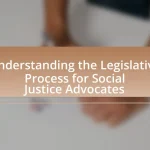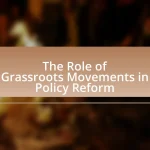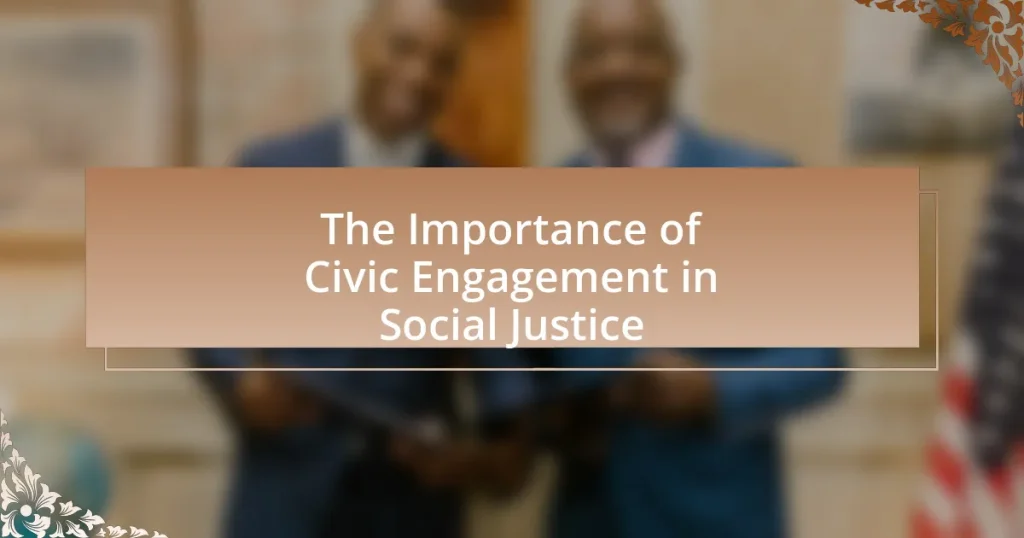Civic engagement is a fundamental aspect of social justice, empowering individuals to participate in decision-making processes that impact their communities. This article explores the significance of civic engagement in promoting accountability, transparency, and equitable policies, highlighting its role in reducing systemic inequalities and enhancing public services. Key components of civic engagement, such as participation, awareness, and advocacy, are examined alongside the challenges faced, including misinformation and socioeconomic barriers. The article also discusses historical examples of civic engagement’s impact on social justice movements and outlines practical steps individuals can take to enhance their civic involvement for meaningful change.
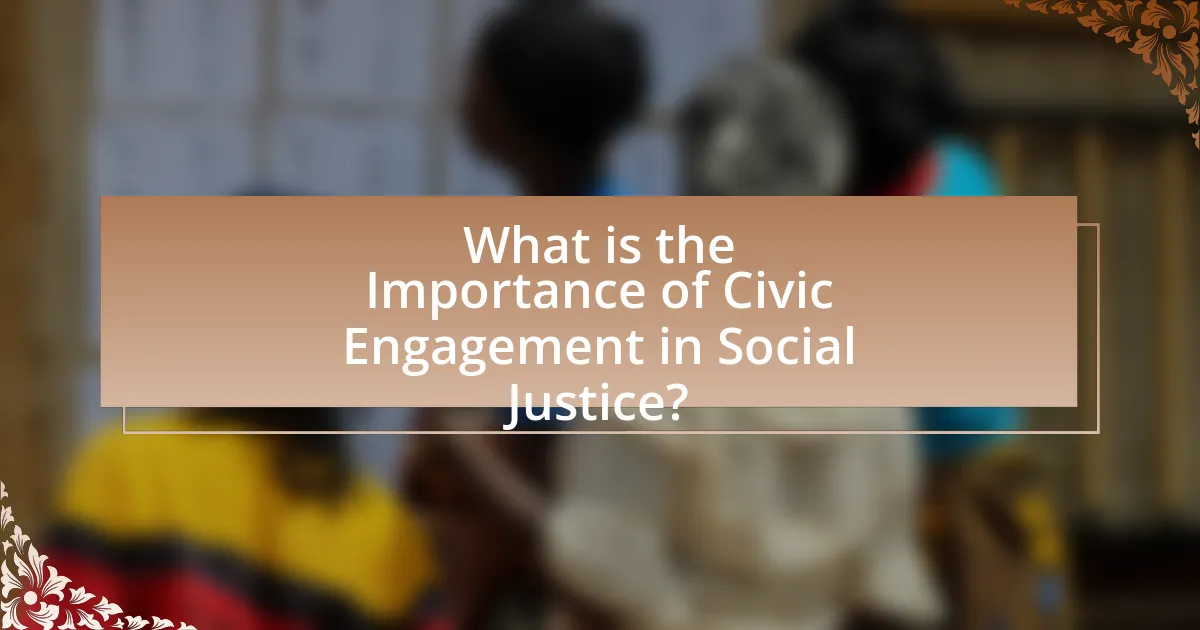
What is the Importance of Civic Engagement in Social Justice?
Civic engagement is crucial for social justice as it empowers individuals to participate in decision-making processes that affect their communities. This participation fosters accountability and transparency in governance, ensuring that marginalized voices are heard and considered. For instance, research by the National Civic League indicates that communities with higher levels of civic engagement experience improved social outcomes, such as reduced inequality and enhanced public services. Furthermore, civic engagement mobilizes collective action, which is essential for advocating policy changes that promote equity and justice.
Why is civic engagement crucial for social justice?
Civic engagement is crucial for social justice because it empowers individuals and communities to advocate for their rights and influence policy decisions. When citizens actively participate in democratic processes, such as voting, attending town hall meetings, or engaging in community organizing, they can address systemic inequalities and hold institutions accountable. Research by the National Civic League indicates that communities with higher levels of civic engagement experience improved social outcomes, including reduced poverty rates and enhanced access to education and healthcare. This demonstrates that civic engagement not only fosters a sense of community but also drives meaningful change towards achieving social justice.
What role does civic engagement play in promoting equality?
Civic engagement plays a crucial role in promoting equality by empowering individuals and communities to participate in decision-making processes that affect their lives. This participation fosters a sense of ownership and accountability, leading to policies that address the needs of marginalized groups. For instance, research by the National Civic League indicates that communities with higher levels of civic engagement experience more equitable access to resources and services, as engaged citizens advocate for their rights and influence local governance. Additionally, civic engagement initiatives, such as voter registration drives and community organizing, have been shown to increase political representation for underrepresented populations, further advancing equality.
How does civic engagement influence policy changes?
Civic engagement influences policy changes by mobilizing public opinion and fostering community involvement in decision-making processes. When citizens actively participate in civic activities, such as voting, advocacy, or public forums, they create pressure on policymakers to address their concerns and priorities. For instance, research by the Pew Research Center indicates that communities with higher levels of civic engagement tend to have more responsive local governments, as elected officials recognize the need to align policies with the interests of engaged constituents. This dynamic illustrates how civic engagement not only raises awareness about social issues but also translates into tangible policy reforms that reflect the collective voice of the community.
What are the key components of civic engagement?
The key components of civic engagement include participation, awareness, and advocacy. Participation involves individuals actively taking part in community activities, such as voting, volunteering, and attending public meetings, which fosters a sense of responsibility and connection to societal issues. Awareness refers to understanding social, political, and economic contexts that affect communities, enabling informed decision-making and action. Advocacy encompasses efforts to influence public policy and promote social change, often through organized campaigns or grassroots movements. These components collectively empower individuals to contribute to social justice initiatives, as evidenced by studies showing that engaged citizens are more likely to support equitable policies and community development.
What activities constitute civic engagement?
Civic engagement includes activities such as voting, volunteering, participating in community service, attending town hall meetings, and advocating for social issues. These activities enable individuals to contribute to their communities and influence public policy. For instance, according to the U.S. Census Bureau, voter turnout in the 2020 election was approximately 66.8%, highlighting the significance of voting as a form of civic engagement. Additionally, the National Conference on Citizenship reports that volunteering can lead to increased community cohesion and improved social outcomes, demonstrating the impact of these activities on social justice.
How do community organizations facilitate civic engagement?
Community organizations facilitate civic engagement by providing platforms for individuals to participate in local governance and social initiatives. These organizations often organize events, workshops, and forums that educate community members about their rights and responsibilities, thereby empowering them to take action. For instance, according to a study by the National Civic League, community organizations that engage residents in decision-making processes increase voter turnout by an average of 20%. This demonstrates that structured involvement through community organizations not only informs citizens but also motivates them to engage actively in civic duties, contributing to a more informed and participatory society.
What challenges does civic engagement face in social justice?
Civic engagement in social justice faces significant challenges, including systemic inequality, lack of access to resources, and political disenfranchisement. Systemic inequality often marginalizes certain communities, making it difficult for them to participate fully in civic activities. For instance, according to the U.S. Census Bureau, voter turnout among minority groups is consistently lower than that of white populations, reflecting barriers such as voter ID laws and limited access to polling places. Additionally, lack of access to resources, including education and funding, hinders grassroots organizations from mobilizing effectively. Political disenfranchisement, characterized by gerrymandering and restrictive voting laws, further exacerbates these challenges, limiting the ability of marginalized groups to influence policy and advocate for social justice.
What barriers prevent effective civic engagement?
Barriers that prevent effective civic engagement include lack of access to information, socioeconomic disparities, and systemic disenfranchisement. Lack of access to information limits individuals’ understanding of civic processes and opportunities for participation, as evidenced by studies showing that communities with lower educational attainment often have reduced civic involvement. Socioeconomic disparities create obstacles such as time constraints and financial limitations, which hinder participation in civic activities; for instance, individuals working multiple jobs may find it difficult to engage in community meetings or advocacy efforts. Systemic disenfranchisement, including voter suppression tactics and gerrymandering, further marginalizes certain populations, reducing their ability to influence decision-making processes. These barriers collectively undermine the potential for meaningful civic engagement, particularly in the context of social justice initiatives.
How can misinformation impact civic participation?
Misinformation can significantly undermine civic participation by creating confusion and distrust among the public. When individuals are exposed to false or misleading information, they may become disillusioned with the political process, leading to decreased voter turnout and engagement in community initiatives. For example, a study by the Pew Research Center found that 64% of Americans believe misinformation has a major impact on their ability to make informed decisions about political issues. This erosion of trust can result in apathy, where citizens feel their participation is futile, ultimately weakening democratic processes and social justice movements.
How can individuals enhance their civic engagement?
Individuals can enhance their civic engagement by actively participating in community organizations and local governance. Engaging in local organizations, such as neighborhood associations or advocacy groups, allows individuals to voice their concerns and influence decision-making processes. Additionally, attending town hall meetings and public forums provides opportunities to interact with elected officials and express opinions on community issues. Research indicates that communities with higher levels of civic engagement experience improved social cohesion and better public services, as seen in studies conducted by the National Civic League, which highlight the correlation between civic participation and community well-being.
What strategies can communities adopt to promote civic engagement?
Communities can adopt strategies such as organizing public forums, facilitating volunteer opportunities, and implementing educational programs to promote civic engagement. Public forums allow residents to discuss local issues and voice their opinions, fostering a sense of community involvement. Volunteer opportunities, such as community clean-ups or local advocacy groups, encourage participation and build connections among residents. Educational programs that inform citizens about their rights and responsibilities can empower individuals to engage in civic activities. Research shows that communities with active civic engagement initiatives experience higher levels of voter turnout and community participation, indicating the effectiveness of these strategies in enhancing social justice.
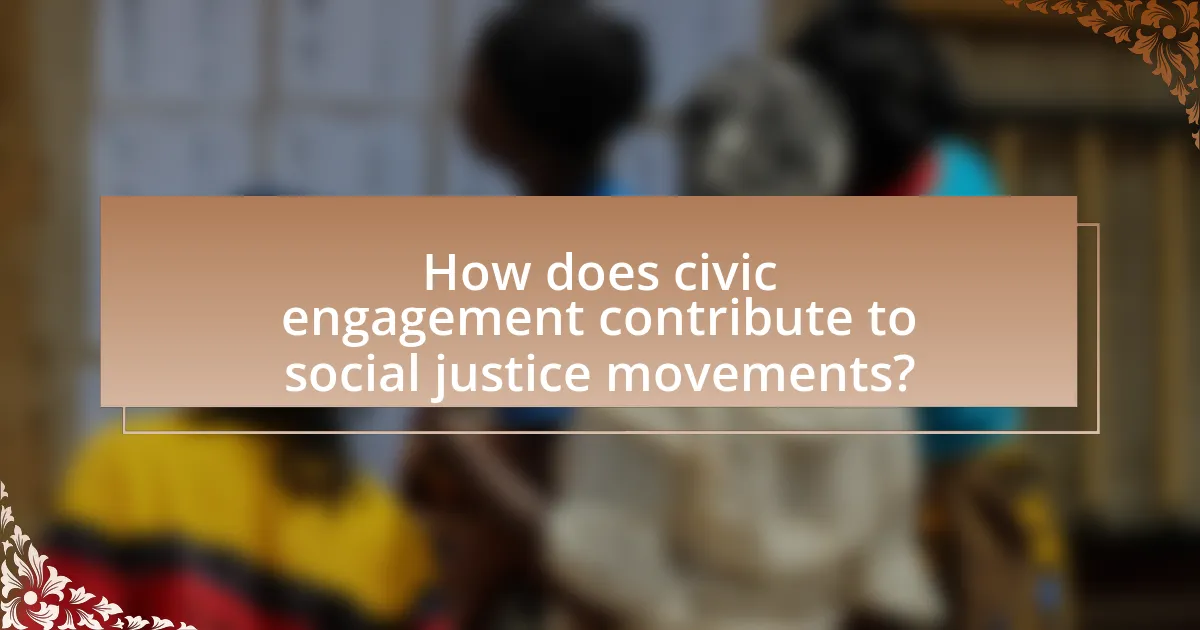
How does civic engagement contribute to social justice movements?
Civic engagement significantly contributes to social justice movements by mobilizing communities to advocate for equitable policies and practices. When individuals participate in civic activities such as voting, attending town hall meetings, or organizing protests, they amplify their voices and influence decision-makers. For instance, the Civil Rights Movement in the United States saw widespread civic engagement through voter registration drives and peaceful demonstrations, which were crucial in achieving landmark legislation like the Voting Rights Act of 1965. This historical example illustrates how collective civic action can lead to substantial social change and promote justice for marginalized groups.
What historical examples illustrate the impact of civic engagement on social justice?
Historical examples that illustrate the impact of civic engagement on social justice include the Civil Rights Movement in the United States and the anti-apartheid movement in South Africa. The Civil Rights Movement, particularly from the 1950s to the 1960s, involved widespread protests, voter registration drives, and legal challenges led by figures such as Martin Luther King Jr. and organizations like the NAACP, resulting in significant legislative changes like the Civil Rights Act of 1964 and the Voting Rights Act of 1965, which dismantled institutionalized racial discrimination. Similarly, the anti-apartheid movement, spearheaded by activists like Nelson Mandela and organizations such as the African National Congress, mobilized international support and local protests, ultimately leading to the end of apartheid in the early 1990s and the establishment of a democratic South Africa. These movements demonstrate how civic engagement can effectively challenge and change unjust systems.
How did civic engagement shape the Civil Rights Movement?
Civic engagement significantly shaped the Civil Rights Movement by mobilizing individuals and communities to advocate for social justice and equality. Grassroots organizations, such as the Student Nonviolent Coordinating Committee (SNCC) and the Southern Christian Leadership Conference (SCLC), utilized civic engagement strategies like voter registration drives, peaceful protests, and community organizing to challenge systemic racism. For instance, the 1963 March on Washington, which drew over 250,000 participants, exemplified how collective civic action could influence public opinion and policy, leading to landmark legislation like the Civil Rights Act of 1964. This active participation not only raised awareness but also empowered marginalized voices, demonstrating the critical role of civic engagement in achieving civil rights advancements.
What lessons can be learned from past social justice campaigns?
Past social justice campaigns demonstrate the critical importance of grassroots mobilization and coalition-building. Successful movements, such as the Civil Rights Movement in the United States, relied on community organizing and collective action to challenge systemic injustices. For instance, the Montgomery Bus Boycott in 1955 showcased how sustained, organized efforts could lead to significant policy changes, such as the desegregation of public transportation. Additionally, these campaigns highlight the necessity of clear messaging and strategic communication, as seen in the use of media by activists to raise awareness and garner public support. Historical evidence indicates that campaigns with well-defined goals and inclusive participation tend to achieve greater impact, reinforcing the idea that civic engagement is essential for driving social change.
How do different demographics engage in civic activities?
Different demographics engage in civic activities through varying levels of participation influenced by factors such as age, education, income, and ethnicity. For instance, younger individuals often participate in civic activities like protests and social media campaigns, while older adults may engage more in traditional forms such as voting and community service. Research indicates that individuals with higher education levels are more likely to participate in civic activities, as evidenced by a study from the Pew Research Center, which found that 70% of college graduates reported voting in the last election compared to 50% of those with only a high school diploma. Additionally, ethnic minorities often engage in civic activities to advocate for social justice issues that directly affect their communities, as highlighted in the work of the American Political Science Review, which shows that minority groups mobilize around issues like immigration and civil rights.
What factors influence civic engagement among youth?
Civic engagement among youth is influenced by several key factors, including education, social networks, and access to resources. Education plays a crucial role, as studies show that higher levels of education correlate with increased civic participation; for instance, a report by the National Youth Leadership Council indicates that youth who receive civic education are more likely to engage in community service and political activities. Social networks also significantly impact engagement; youth who are connected to peers and mentors involved in civic activities are more likely to participate themselves. Additionally, access to resources, such as information about civic opportunities and transportation to events, can facilitate or hinder youth involvement in civic activities.
How does socioeconomic status affect participation in civic activities?
Socioeconomic status significantly affects participation in civic activities, as individuals with higher socioeconomic status tend to engage more in civic activities compared to those with lower status. This disparity arises from factors such as access to resources, education, and social networks, which are often more abundant for individuals in higher socioeconomic brackets. For instance, a study by Verba, Schlozman, and Brady in “Voice and Equality: Civic Voluntarism in American Politics” (1995) found that individuals with higher income and education levels are more likely to vote, attend public meetings, and engage in community organizations. This correlation indicates that socioeconomic status is a critical determinant of civic engagement, influencing both the capacity and motivation to participate in civic activities.
What role does technology play in modern civic engagement?
Technology plays a crucial role in modern civic engagement by facilitating communication, mobilization, and access to information. Digital platforms enable individuals to connect with like-minded citizens, organize events, and advocate for social justice issues more efficiently. For instance, social media has been instrumental in movements such as Black Lives Matter, where platforms like Twitter and Facebook have allowed for rapid dissemination of information and mobilization of protests. According to a 2020 Pew Research Center study, 53% of Americans reported that social media has helped them become more involved in civic activities. This demonstrates that technology not only enhances participation but also empowers marginalized voices in the civic landscape.
How has social media transformed civic participation?
Social media has transformed civic participation by providing platforms for real-time communication, mobilization, and engagement among citizens. These platforms enable individuals to organize protests, share information, and advocate for social justice issues more effectively than traditional methods. For instance, the Arab Spring demonstrated how social media facilitated mass mobilization, allowing citizens to coordinate protests and disseminate information rapidly, leading to significant political changes in several countries. Additionally, studies show that social media campaigns can increase voter turnout; for example, a 2018 study published in the American Economic Journal found that social media outreach significantly boosted participation in local elections. This shift has made civic engagement more accessible and inclusive, allowing diverse voices to contribute to public discourse.
What are the risks and benefits of online civic engagement?
Online civic engagement presents both risks and benefits. The benefits include increased accessibility to political participation, as individuals can engage from anywhere with internet access, leading to greater inclusivity and representation. For instance, a study by the Pew Research Center found that 69% of adults in the U.S. use social media to connect with others about political issues, enhancing community mobilization and awareness.
Conversely, the risks involve misinformation and polarization, as online platforms can amplify false narratives and create echo chambers. Research from the Oxford Internet Institute indicates that exposure to misinformation can significantly influence public opinion and voter behavior, undermining informed civic engagement. Thus, while online civic engagement can democratize participation, it also poses challenges that must be addressed to ensure its effectiveness in promoting social justice.
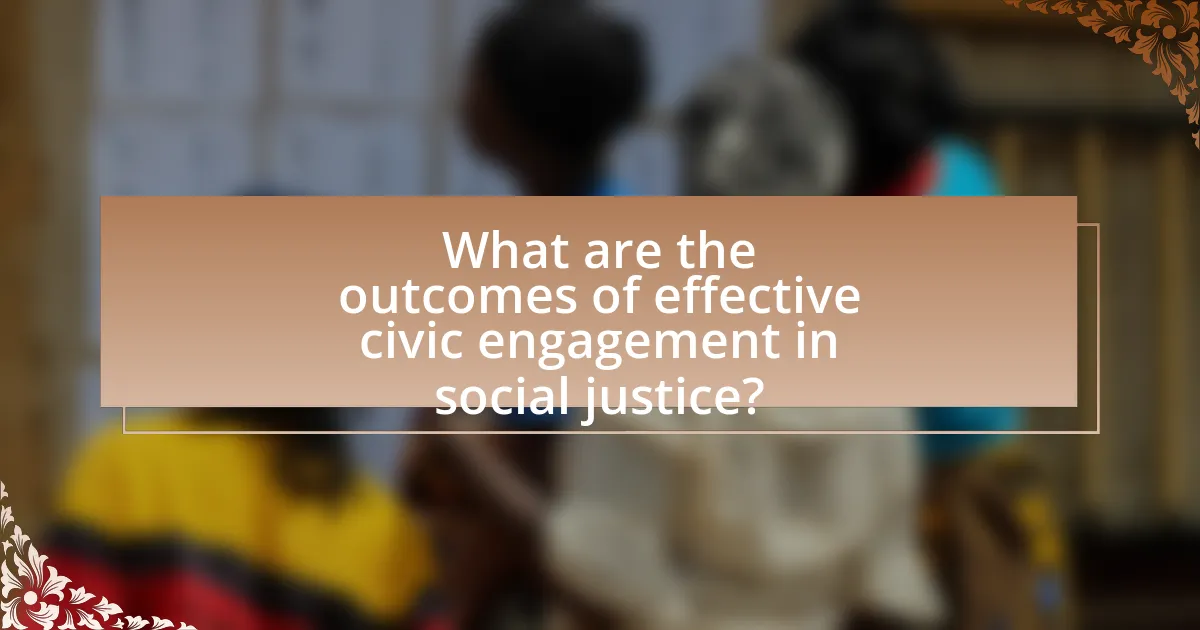
What are the outcomes of effective civic engagement in social justice?
Effective civic engagement in social justice leads to increased awareness, policy changes, and community empowerment. When individuals actively participate in civic activities, such as advocacy, voting, and community organizing, they contribute to a more informed public discourse, which can result in legislative reforms that address social inequalities. For instance, the Civil Rights Movement in the United States demonstrated how organized civic engagement led to significant legal changes, such as the Voting Rights Act of 1965, which aimed to eliminate racial discrimination in voting. Additionally, communities that engage civically often experience enhanced social cohesion and collective efficacy, enabling them to tackle local issues more effectively.
How does civic engagement lead to community empowerment?
Civic engagement leads to community empowerment by fostering active participation in decision-making processes, which enables individuals to influence policies that affect their lives. When community members engage in civic activities, such as voting, attending town hall meetings, or participating in advocacy groups, they gain a voice and can collectively address local issues. Research indicates that communities with higher levels of civic engagement experience improved social cohesion and increased access to resources, as seen in studies by the National Civic League, which highlight that engaged communities are more likely to secure funding and support for local initiatives. This empowerment not only enhances individual agency but also strengthens the overall community by promoting collaboration and shared goals.
What are the long-term benefits of increased civic participation?
Increased civic participation leads to stronger democratic institutions and improved community well-being. When citizens engage actively in civic activities, they contribute to more representative governance, which can enhance policy responsiveness and accountability. Research indicates that communities with higher levels of civic engagement experience lower crime rates and improved public health outcomes, as seen in studies conducted by the National Civic League. Furthermore, increased civic participation fosters social cohesion, leading to more resilient communities capable of addressing social justice issues effectively.
How can civic engagement foster a sense of belonging?
Civic engagement fosters a sense of belonging by actively involving individuals in their communities, which creates connections and shared identities. When people participate in civic activities, such as volunteering, attending town hall meetings, or joining advocacy groups, they build relationships with others who share similar values and goals. Research indicates that communities with higher levels of civic engagement report stronger social ties and a greater sense of belonging among residents. For instance, a study by the National Conference on Citizenship found that individuals who engage in civic activities are more likely to feel connected to their communities and have a sense of purpose, reinforcing the idea that participation leads to a stronger communal identity.
What are the measurable impacts of civic engagement on social justice initiatives?
Civic engagement significantly enhances social justice initiatives by increasing community participation, fostering awareness, and driving policy changes. For instance, research by the National Civic League indicates that communities with higher civic engagement levels experience improved social cohesion and more effective advocacy for equitable policies. Additionally, a study published in the Journal of Community Psychology found that active civic participation correlates with increased funding for social justice programs, demonstrating a direct link between engagement and resource allocation. These measurable impacts underscore the critical role of civic engagement in advancing social justice objectives.
How can we assess the effectiveness of civic engagement efforts?
To assess the effectiveness of civic engagement efforts, one can utilize measurable outcomes such as increased voter turnout, participation in community meetings, and the implementation of policies influenced by public input. Research indicates that communities with higher civic engagement often experience improved social cohesion and policy responsiveness, as evidenced by a study from the National Civic League, which found that cities with active civic engagement initiatives saw a 20% increase in voter participation over a five-year period. Additionally, surveys and feedback mechanisms can provide qualitative data on community perceptions and satisfaction with civic initiatives, further validating their impact.
What indicators show progress in social justice through civic engagement?
Indicators that show progress in social justice through civic engagement include increased voter turnout, enhanced community participation in decision-making processes, and the establishment of equitable policies. Increased voter turnout, for instance, reflects a greater public interest in social issues and a commitment to influencing change, as evidenced by the 2020 U.S. presidential election, where voter turnout reached 66.8%, the highest in over a century. Enhanced community participation can be measured through the number of public forums and town hall meetings held, which allow diverse voices to contribute to local governance. Additionally, the establishment of equitable policies can be tracked through legislative changes that address systemic inequalities, such as the passing of the Equality Act in 2021, aimed at prohibiting discrimination based on sexual orientation and gender identity. These indicators collectively demonstrate the effectiveness of civic engagement in advancing social justice.
What practical steps can individuals take to engage civically for social justice?
Individuals can engage civically for social justice by participating in local community organizations that advocate for equitable policies. Joining groups focused on issues such as racial equality, economic justice, or environmental sustainability allows individuals to collaborate with others who share similar goals. For instance, according to a report by the National Civic League, community engagement initiatives have been shown to improve local governance and foster inclusive decision-making processes. Additionally, individuals can attend town hall meetings, vote in local elections, and contact their representatives to express their views on social justice issues, thereby influencing policy changes directly. Engaging in peaceful protests and awareness campaigns also raises public consciousness about social justice matters, as evidenced by the significant impact of movements like Black Lives Matter in shaping national discourse.
